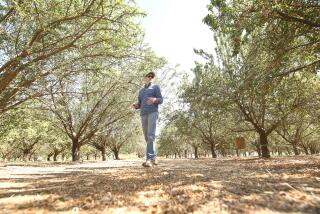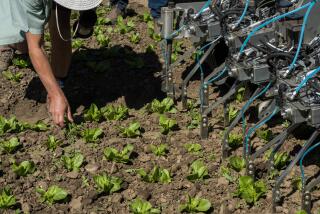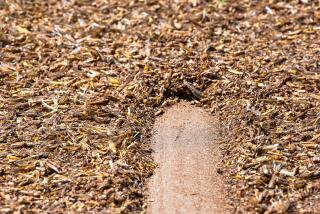Farmers Phasing Out Chemicals
- Share via
During the past decade, agricultural researchers have developed a variety of non-chemical pest control methods to decrease reliance on pesticides.
Known as integrated pest management, or sustainable agriculture, the strategy includes the use of traps, beneficial organisms and the introduction of a harmful insect’s natural predators to keep the pest population in check.
Treasure Farms, a large-scale farming operation in Irvine, uses predatory mites, decollate snails and parasitic wasps to protect its vegetable, avocado and citrus crops from harmful worms, mites and scale.
The strategy has proven effective, especially in citrus, where chemical use has been reduced by 90%. “We used to use chemicals throughout our citrus fields, but by using integrated pest management, we’ve reduced chemical use to only 10%,” said Rachel Neal, pest control adviser at Treasure Farms. An additional 1,200 acres of avocados are now managed entirely without pesticides.
According to Neal, it costs more initially to use bio-control agents. “But build up a insects tolerance to sprays, and pesticides create an imbalance that allows other pests to multiply. So it’s cheaper in the long run to use beneficial insects,” Neal said.
Orange County’s Integrated Pest Management Program The Orange County Department of Agriculture estimates that at least 17,500 acres of local farmland were maintained by integrated pest management methods in 1990. Commissioner John Ellis said that more farmers are using bio-control agents but that nearly all rely on some chemical pesticides to completely protect their crops.
Parasitic Wasp Trichogamma, Tripoblus, Aphytis, Metaphycus
Crop Acres Pest Peppers 800 worms Tomatoes 150 fruit worms Avocados 1,200 worms Avocados 1,200 thrips Citrus 3,300 red & purple scale Citrus 3,300 black scale Total: 17,500
Snails Decollate Crop: Citrus Acres: 3,300 Pest: Brown snail
Mites Phytoseiulus or Metaseiulus Crop: Peppers Acres: 800 Pest: mites
More to Read
Sign up for Essential California
The most important California stories and recommendations in your inbox every morning.
You may occasionally receive promotional content from the Los Angeles Times.













